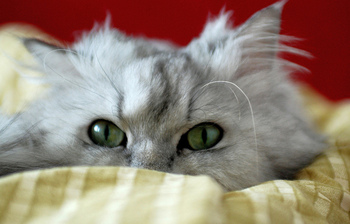By Ralph Benko
What if it's a lie that "curiosity killed the cat"? What if curiosity is just what we now need to save that lost cat named America?
As a fairly notorious archconservative I like to tease (in a friendly way) my very dear Progressive friends. One tease is by telling them that I get most of my information from Rolling Stone, Mother Jones, The New York Review of Books, The New Yorker, The Atlantic Monthly, The New York Times, and NPR ... just as do most Tea Partiers.
This actually is true for me. The tease resides in the assertion that most Tea Partiers do too. Most people -- from the left and the right -- go to publications that reflect their own biases. (We all are biased.) Conservatives are more likely to read National Review, progressives to read MoJo. So what's up with my eccentric reading (and, hello NPR, listening) habits?
Confession: I find very little benefit in reading the thoughts of those with whom I already, usually, agree. There's very little to learn from that. What is really interesting, to me, is to seek out the ideas of the best minds with whom I disagree. Paying respectful attention to thoughts from a counternarrative challenges my thinking.
Paying attention to the perspectives of others helps me keep myself out of (or at least minimize) my own blind spots. (We all have blind spots.) It helps me address the soggy bits in my own worldview. It also has generated in me huge respect for my ideological adversaries, even when, as usual, I am not persuaded by their arguments.
Nassim Nicholas Taleb's provocative 2007 mega best seller, The Black Swan: The Impact of the Highly Improbable, introduces an important thought. Talib, as an aside, notes
"One highlight of the year 2006 was to find in my mailbox a draft manuscript of a book called Cognitive Diversity: How Our Individual Differences Produce Collective Benefits, by Scott Page. Page examines the effects of cognitive diversity on problem solving and shows how variability in views and methods acts like an engine for tinkering. It works like evolution. By subverting the big structures we get rid of the Platonified one way of doing things--in the end, the bottom-up theory-free empiricist should prevail."
"Cognitive diversity" means we see things and process information differently and thereby together are more able to spot opportunities that more likely would elude any one of us. This is an old insight splendidly dressed up in a fancy new name.
There is a famous Eastern parable. Wikipedia relays its use by the Buddha:
"In the Udana he uses the elephant parable to describe sectarian quarrels. A king has the blind men of the capital brought to the palace, where an elephant is brought in and they are asked to describe it.
When the blind men had each felt a part of the elephant, the king went to each of them and said to each: 'Well, blind man, have you seen the elephant? Tell me, what sort of thing is an elephant?'
The men assert the elephant is either like a pot (the blind man who felt the elephant's head), a winnowing basket (ear), a plowshare (tusk), a plow (trunk), a granary (body), a pillar (foot), a mortar (back), a pestle (tail) or a brush (tip of the tail).
The men cannot agree with one another and come to blows over the question of what it is like and their dispute delights the king.
LivingRoomConversations.org, a project co-founded by MoveOn.org co-founder Joan Blades with which I am intimately involved has systematized and makes easy the process of learning to listen, respectfully, to one another. Most of the tiny team of leaders of this project engage in this to find common ground on contentious issues of the day. Their curiosity and open-mindedness (even to my bewilderingly archconservative views) is a delight. It works!
I myself love this out of my love of the paradoxical. As Niels Bohr once observed, "How wonderful that we have met with a paradox. Now we have some hope of making progress." Paradoxes -- by definition -- cannot exist. There can be no square circles. Encountering the appearance of the paradoxical allows us to resolve our blind spots.
Progressives, famously, wonderfully, celebrate diversity. By adding cognitive diversity to the celebration party ... we "have some hope of making progress." As LivingRoomConversations.org shows: curiosity is our best hope of saving the cat.

